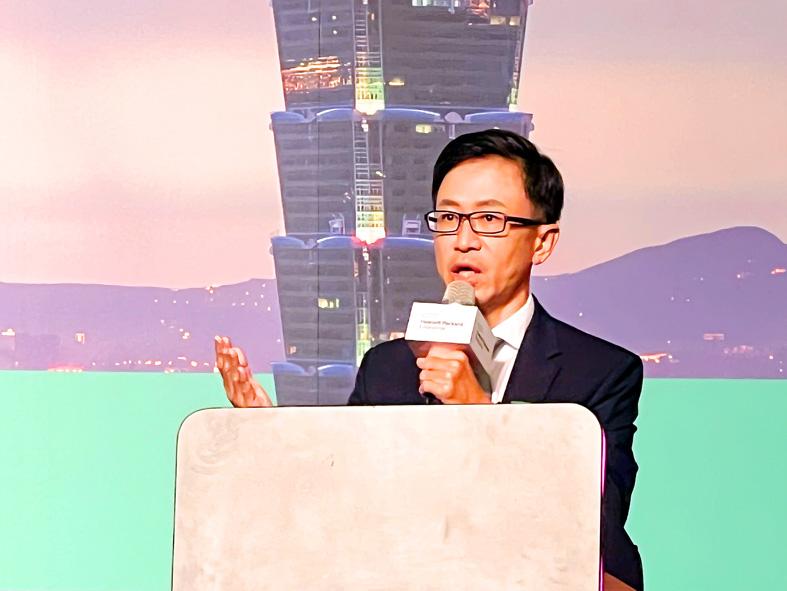Hewlett-Packard Enterprise Co (HPE) has laid out a plan to make Taiwan its global next-generation innovative technology and strategic supply-chain hub, focusing on technologies such as 5G applications, edge computing and high-performance computing.
At a news conference, HPE Taiwan managing director and president Jon Wang (王嘉昇) said the company would increase its investment and build the company’s presence in Taiwan to develop a wide range of next-generation technologies.
Wang did not provide specifics on the size of HPE’s investment in Taiwan, saying only that the company would spend millions of New Taiwan dollars to upgrade its research and development facility in Taiwan to bolster the development of its server and storage services.

Photo: CNA
Taiwan is well-positioned to be HPE’s technology hub, because, with the help of Taiwanese suppliers, it has become a center of procurement, planning, raw materials management and engineering for the company, Wang said.
At the same time, HPE’s global strategic procurement center has been led by its Taiwanese operations and the center plans to have local professionals work with other Taiwanese tech companies, he said.
HPE — which was spun off from PC giant Hewlett-Packard Co (HPE) in 2015 to focus on a portfolio covering data centers, cloud services, and workplace applications — has seen its workforce in Taiwan grow by about 30 percent in the past three years, Wang said, adding that the company is hiring to fill about 100 more vacancies.
With Taiwan’s tech-driven economy, rich supplier ecosystem and large high-tech talent pool, HPE has steadily boosted investment in Taiwan over the past 50 years, he said.

SEMICONDUCTORS: The German laser and plasma generator company will expand its local services as its specialized offerings support Taiwan’s semiconductor industries Trumpf SE + Co KG, a global leader in supplying laser technology and plasma generators used in chip production, is expanding its investments in Taiwan in an effort to deeply integrate into the global semiconductor supply chain in the pursuit of growth. The company, headquartered in Ditzingen, Germany, has invested significantly in a newly inaugurated regional technical center for plasma generators in Taoyuan, its latest expansion in Taiwan after being engaged in various industries for more than 25 years. The center, the first of its kind Trumpf built outside Germany, aims to serve customers from Taiwan, Japan, Southeast Asia and South Korea,

Gasoline and diesel prices at domestic fuel stations are to fall NT$0.2 per liter this week, down for a second consecutive week, CPC Corp, Taiwan (台灣中油) and Formosa Petrochemical Corp (台塑石化) announced yesterday. Effective today, gasoline prices at CPC and Formosa stations are to drop to NT$26.4, NT$27.9 and NT$29.9 per liter for 92, 95 and 98-octane unleaded gasoline respectively, the companies said in separate statements. The price of premium diesel is to fall to NT$24.8 per liter at CPC stations and NT$24.6 at Formosa pumps, they said. The price adjustments came even as international crude oil prices rose last week, as traders

Taiwan Semiconductor Manufacturing Co (TSMC, 台積電), which supplies advanced chips to Nvidia Corp and Apple Inc, yesterday reported NT$1.046 trillion (US$33.1 billion) in revenue for last quarter, driven by constantly strong demand for artificial intelligence (AI) chips, falling in the upper end of its forecast. Based on TSMC’s financial guidance, revenue would expand about 22 percent sequentially to the range from US$32.2 billion to US$33.4 billion during the final quarter of 2024, it told investors in October last year. Last year in total, revenue jumped 31.61 percent to NT$3.81 trillion, compared with NT$2.89 trillion generated in the year before, according to

SIZE MATTERS: TSMC started phasing out 8-inch wafer production last year, while Samsung is more aggressively retiring 8-inch capacity, TrendForce said Chipmakers are expected to raise prices of 8-inch wafers by up to 20 percent this year on concern over supply constraints as major contract chipmakers Taiwan Semiconductor Manufacturing Co (TSMC, 台積電) and Samsung Electronics Co gradually retire less advanced wafer capacity, TrendForce Corp (集邦科技) said yesterday. It is the first significant across-the-board price hike since a global semiconductor correction in 2023, the Taipei-based market researcher said in a report. Global 8-inch wafer capacity slid 0.3 percent year-on-year last year, although 8-inch wafer prices still hovered at relatively stable levels throughout the year, TrendForce said. The downward trend is expected to continue this year,